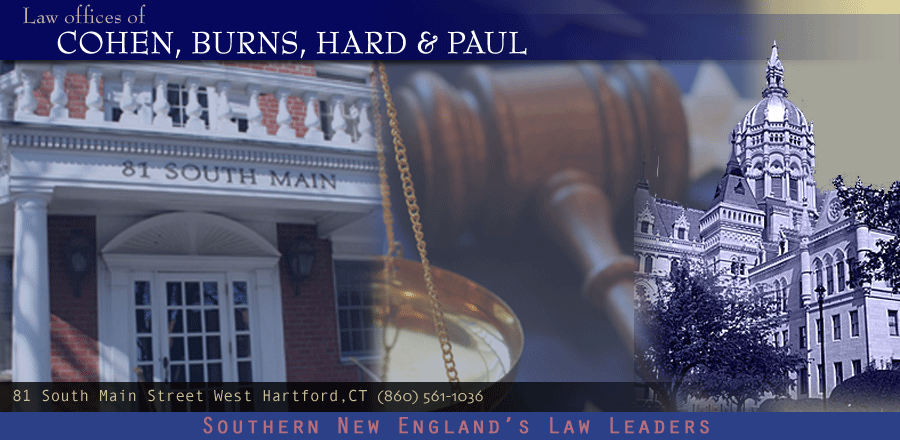
- Home
- Attorney Profiles
- Articles
- A homeowner History Lesson
- Reverse Mortgage- Tax Free Income
- Deficit Reduction Act
- Searching for an "Active Adult" home?
- Estates for Life
- Power of Attorney
- Advanced Health Care Directives
- Health Savings Accounts
- Attorney Eric Hard's Article on Jury Selection for Connecticut Lawyer Magazine
- Attorney Eric Hard Appears on Fox CT TV News to Discuss Tom Brady Deflategate Ruling
- F.A.Q.
- Contact us
Services
Practice Areas
- Real Estate
- Commercial law
- Personal injury
- Litigation
- Bankruptcy
- Landlord/tenant
- Family law
- Criminal law
Offices
81 South Main Street
West Hartford, CT
(West Hartford Center)
(860) 561-1036191 Albany Turnpike
Collinsville, CT
(Rte 44, near the Shoppes at Canton)
(860) 693-1201
![]()

Eric Hard
Admitted to Massachusetts Bar in 1986; admitted to Washington, DC Bar in 1988; admitted to Connecticut Bar in 1990; admitted to Supreme Court Bar in 2018. Juris Doctor Degree, University of Michigan Law School, 1986. MS Degree, Columbia University Graduate School of Journalism, 1987. BA Degree, Vassar College, 1982. Particular areas of concentration - real estate, litigation, consumer and commercial collections, personal injury, foreclosure, consumer protection law, mechanic's lien law, contract disputes, discrimination law and bankruptcy.
Attorney Eric Hard Discusses Antonio Brown Allegations, The Patriots and the Law
Atty. Eric Hard on Antonio Brown et al
Attorney Eric Hard Appears on Fox CT TV News to Discuss Tom Brady Deflategate RulingAttorney Eric Hard's Interview with "A Civil Action" Toxic Tort Lawyer Jan Schlichtmann
Connecticut Lawyer contributor Eric Hard chatted with Attorney Jan Schlichtmann, portrayed by John Travolta in the movie "A Civil Action", who represented families of children poisoned by environmental contamination in Woburn Massachusetts. Schlictmann was a featured speaker at the Spring Reawakening event at the American Museum of Torts in Winsted, on April 2.
Interview With Attorney Mitchell Garabedian for Connecticut Lawyer Magazine
Connecticut Lawyer contributor Eric Hard recently spoke with Attorney Mitchell Garabedian, a featured speaker on occasion of the Spring Awakening, the reopening of the American Museum of Tort Law in Winsted, Connecticut. Garabedian was portrayed by Stanley Tucci in the movie "Spotlight", and represented victims of priest abuse and Catholic church corruption in Boston, Massachusetts.
Attorney Eric Hard's Interview with Consumer Advocate Ralph Nader for Connecticut Lawyer Magazine
Attorney Eric Hard spoke with consumer advocate Ralph Nader on occasion of the Spring Awakening, the reopening of the American Museum of Tort Law in Winsted, with guest speakers, including trial lawyers Jan Schlictmann and Mitchell Garabedian. With concerns awakened among civil libertarians and others about the recent presidential election, the lessons offered by each of these advocates may provide some clues as to how to keep constitutional liberties in the public discourse and connect people to popular and well-known lawsuits, such the toxic tort case in Woburn, MA that led to the movie A Civil Action (Schlictmann) and the work of a trial lawyer (Garabedian) in Boston as depicted in the movie Spotlight. This is the first interview in a three-part series. Read more...
Attorney Eric Hard's Article on Jury Selection for Connecticut Lawyer Magazine
The civil jury selection process in Connecticut state court is unique in that counsel are allowed to examine each individual candidate apart from other prospective jurors. Other forums, including federal court within Connecticut, typically place counsel in a group interview, with various restrictions placed on any colloquy between attorney and prospective juror. Because of this opportunity to get to know jury members more intimately, the question arises, what are the rules of thumb? Set forth below are some tips for Connecticut state civil voir dire.
Strive for Polite Familiarity If you have the chance to get to know someone who will soon be in a position to either hurt or help you and your client, why not try to make friends? The trick is to achieve some complicity, but without appearing too eager to curry favor. A polite tone, with a conversational quality not unlike you might use with friends, is a good way to start.
Root Out Trouble If there is someone who simply feels too strongly to give your client a fair shake about an issue that is integral to your trial, you do not want to allow that person on your jury inadvertently. It may be hard to root out someone who is determined to respond in a stealth-like fashion so as to make it onto the jury and mete out their asymmetric brand of justice, but a fair number of people will be relatively candid about their beliefs, if only you ask them. To prune out this sort of person, you can ask: Is there any question that I have not asked that, if it were asked, and you answered it, I would realize that my client would not want you on this jury?
Save a Peremptory Challenge You may have unlimited challenges to a worrisome juror if you can persuade the court that your objection is legitimate, but you should be prepared to get an adverse ruling right around the time you encounter a candidate who, every fiber in your being tells you, must not be a part of your case. For such a situation, the sole remedy is a peremptory challenge, and you want to be sure to have one remaining as a safeguard from disaster.
Prior Dealings with the Justice System Your questioning should include whether the prospective juror or his or her family or friends have had any experience or connection with the justice system that may color the way this person will view the case.
If You Have a Negative, State It, and Ask If the Juror Can Be Fair If there is some aspect to your client's case that reflects badly, and if there is likely no way to keep that information from the jury, it makes sense to share the information with the jury up front to diminish its impact when it arises during the trial. The jurors will already know it is coming, and they will have already agreed to keep an open mind about the case, notwithstanding.
Say Only What Is True When you describe the case, when you make any assertion during voir dire, take pains to say only things that are uncontrovertibly true. The reason for this is that some bundle of true things are the strongest presentation of your client's case. Assertions that are later shown to be untrue change your status in the eyes of the jury, and you become unreliable as a narrator. Your goal is to be the jury's guide, the teller of truth, the person on whom they may rely as a guide to the case as a whole. The mere fact that other truth out there undermines your case is irrelevant; simply stick to the true things that support your claims, and don't belabor or distort those areas that hurt you.
Ask Them to Describe Themselves Most of us have a story to tell, and those drafted for jury duty are no exception. If you ask an open-ended question of a juror about themselves, and if you listen in a way that makes clear you are interested in his or her story, often a great deal of information will spill forth, some of which will go a long way to reveal whether you want them on your jury. Education, employment, leisure pursuits, pet peeves, deep beliefs, and peculiarities all can be elicited here. The more comfortable jurors become as they tell their story, the more likely they will "leak" information that is significant to your case that might otherwise remain under wraps.
If the Burden of Proof Helps Your Client, Talk About It In most civil cases, the burden of proof is preponderance of the evidence, more likely than not, which may be portrayed as tipping a scale ever so slightly in your client's direction if you are the party seeking to meet that burden. If so, acquainting prospective jurors with this standard, and confirming that they will not hesitate to apply it based on instructions from the judge, is a way of introducing at the outset of the case that no more severe test should be in place than a mere preponderance.
Prior Dealings with the Subject Matter to Be Tried If there is one sure path for a juror to go astray, it is for the case being tried to include elements dealt with by that juror in some prior life circumstance. The risk is that the juror will superimpose his or her experience on the case at hand, with the memories, opinions, and other dross not properly part of the matter to be tried, contaminating not only that juror's perception, but that of others as well. If a juror has had a prior experience that includes significant elements to be tried, it is important to find out about it and likely excuse that juror on that ground. CL